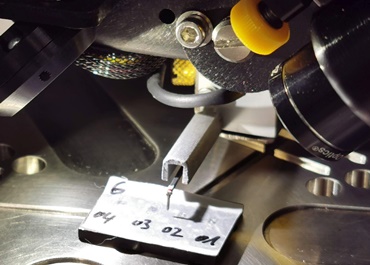Tribology and Surface Analysis
Activities in this group cover both research and industrial services. On the one hand, understanding the basic mechanisms of wear and friction is advantageous in a large variety of applications. These include industrial machinery with sliding or rolling components, engines, artificial joints, watches, and wind turbines. An important aspect in the process of understanding interactions at surfaces is a thorough surface analysis. To achieve this, expertise and equipment required to fully characterize various surfaces are available.

Scientific research
Research in the field of tribology has focused largely on determining the mechanisms of lubrication and investigating the interaction between lubricants and the surface. This involves measurement using a variety of tribometers, which allow wear and friction to be determined under a range of speed, load, and temperature.
The friction and wear measurements are complimented by surface analysis. Wear is measured by optical or contact profilometry and assessed using scanning electron microscopy. The surface chemistry is examined using ToF-SIMS and XPS. These techniques are especially useful when examining the adsorption and reaction of lubricant additives at the surface.
Comprehensive surface analysis is required in many fields of research. Surface chemistry plays a role in sensors, in biological interactions with implants, in the development of techniques to study surface interactions (patterning, gradients). By combining ToF-SIMS and XPS a full picture of the chemistry at the surface can be obtained. This is complemented by AFM and profilometry, which allow the topography of the surface to be measured.
Industrial services
Services are offered to cover a variety of industrial needs. Materials used at sliding or rolling surfaces may be altered to improve durability and energy consumption. Alternatively, new regulations may dictate that presently used materials are no longer acceptable. In both cases, an assessment of the friction and wear behavior of new materials in the laboratory can greatly reduce the number of candidate materials to be used in field tests and therefore, cuts costs. Sliding or rolling components can unexpectedly fail resulting in costly repairs and down-time. In such cases, an analysis of the cause of failure is recommended to ensure a smooth operation of the affected equipment.
Services are also offered in the field of surface analysis. This can range from analyses required to determine contaminants to investigations of the chemical interactions at surfaces. Surface chemistry plays a role in many applications including microelectronics, semiconductors, and biological implants.
-
Share

